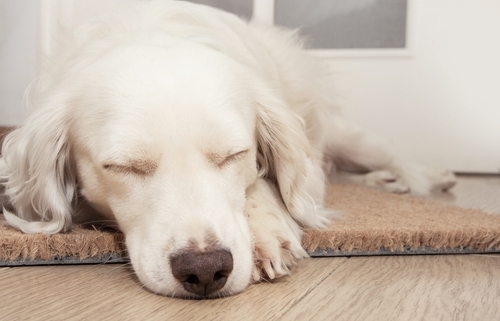Sleep Disorders in Dogs
Did you know that the average dog sleeps about 12 to 14 hours a day? This is a combined total through daytime naps and nighttime sleep. Like humans, sleep is essential to a dog’s overall health. Not only that, but it also helps a dog feel more rested and energetic. A lot of people do not realize that dogs may develop sleep disorders throughout their lifetime. Because lack of sleep can cause a buildup of stress hormones, dogs with sleep disorders may also become more aggressive or develop other behavioral problems. We are going to introduce you to some of the most common types of sleep disorders in dogs.
Narcolepsy – This is a nervous system sleep disorder that primarily affects young dogs. It is commonly caused by a genetic disorder that leads to abnormally low levels of a chemical called hypocretin. A dog with narcolepsy will collapse on its side and fall asleep. This usually occurs after a period of excitement or physical activity.
Sleep Apnea – This is generally uncommon in dogs. However, it is more common in obese dogs and breeds with flat faces (think about English Bulldogs, Boston Terriers, and Pugs). Sleep apnea can cause constant sleep interruptions throughout the night. Unfortunately, if it is left untreated, it can be life-threatening. Please do not hesitate to contact your veterinarian if your dog is snoring loudly and constantly waking up during the night.
Insomnia – This can be caused by physical health issues that are painful such as arthritis, fleas, or frequent urination. Anxiety and stress can also lead up to insomnia. A veterinarian is best suited to determine the underlying problem and prescribe appropriate treatment.
REM Behavior Disorder – This causes physical activity during sleep. For some dogs, this activity can become extreme or violent, such as running into walls or attacking objects. Dogs with REM Behavior Disorder will awaken normally without any confusion or disorientation. Your veterinarian may prescribe a medication called clonazepam which will reduce the physical activity during sleep.



